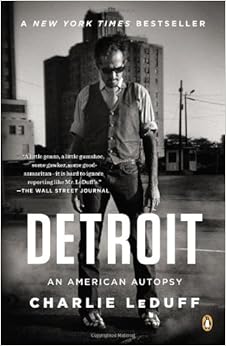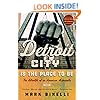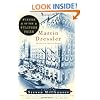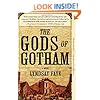



Detroit: An American Autopsy Paperback – January 28, 2014
| Amazon Price | New from | Used from |
|
Audio CD, Audiobook, Unabridged
"Please retry"
|
$8.99 | $16.01 |

Don't have a Kindle? Get your Kindle here, or download a FREE Kindle Reading App.
Product Details
Would you like to update product info or give feedback on images?.
|
Editorial Reviews
From Booklist
Review
“Eric Martin hits all the right notes. . . . The author’s edgy tone is tough and uncompromising, befitting the harsh realities facing those who remain in the troubled city. Martin’s narration mirrors LeDuff’s writing as he voices the poverty, corruption, and crime of the city as well as the brash and irreverent personality of the author himself.”
—AudioFile [Earphones Award Winner]
“Full of both literary grace and hard-won world-weariness. . . . Iggy Pop meets Jim Carroll and Charles Bukowski.”
—Kirkus [HC starred review]
“Martin’s reading is honest and forthright.”
—Booklist
“Martiṉs narration is exactly right, reflecting all of LeDuff’s sincerity, outrage, and despair. . . . This masterly snapshot of a city in ruins translates superbly to the spoken word.”
—Library Journal [starred review]
“A powerfully narrated testimony to the American spirit and its challenges.”
—California Bookwatch
“LeDuff explores it all with literary grace and justified indignation about what’s befallen a place he loves.”
—Minneapolis Star Tribune
More About the Author
Customer Reviews
Most Helpful Customer Reviews
It was not quite the homecoming that Charlie LeDuff had hoped for. LeDuff had won a Pulitzer Prize during an 11year stint as a staff reporter for the New York Times. In 2007 he abruptly quit his gig as a member of the Times Los Angeles bureau after he decided that he was tired of L.A. and that his wife and three year old daughter really needed to be around family. Charlie LeDuff's clan resided in and around the city of Detroit. Much to his surprise when he contacted the lowly, virtually bankrupt Detroit News about a position he found that one was available. The die was now cast. His bosses at The News had already figured out the best way to utilize their talented new reporter. They told him to "chronicle the decline of the Great Industrial American City." This was going to be right up his alley. Charlie LeDuff liked to get his fingernails dirty. He knew things were pretty bad in his hometown but until he actually arrived there he had no idea just how ugly it had gotten. "Detroit: An American Autopsy" is the rough and tumble story of a city in total free fall. Perhaps what is most frightening about what you will read in this book is that what has happened in Detroit could well be repeated in a number of other major urban areas around this nation.
So just who is to blame for the demise of this once great American city? Depending on your politics just about everyone has a theory.Read more ›
But I always came at it from the perspective that the country is mid-collapse. That we still have time. That we can still swing the wheel and, for the most part, make it through. Sure, we'll pay $8 for a gallon of gas, we'll overpay for armies of contractors we don't need, but we will make it through. We're America after all.
Charlie LeDuff convinced me we may be too late. The book is aptly titled, Detroit: An American Autopsy. What if the land of the free, of prosperity, of two cars and a picket fence succumbed to the corrupt, the incompetent, the immoral?
He describes the imbeciles that run Detroit - not just its corrupt, race-baiting politicians, but also the evil puppet masters, the CEOs, that pulled their strings. He takes us on a journey through those we abandoned on the front line, one he describes as a "landscape of fire and human failing." We watch them live, fight, and die. He talks to the workers in factories, once producing subprime mortgages, now reduced to relabeling screws. He speaks with the mothers of the dead. We walk with him as he tries to make change, failing more often than not. His own life is inexorably tied into that of his failed city, so we feel his guilt, his family's mourning, the pain of finding work, the toll it takes.
He writes like Naipaul. Blisteringly honest. Solid, real flow.
And it presents the viewpoint that we're not careening into failure. We're already there. Ours is a state soon to be hollowed out by failed cities. America was murdered. What we live in is fundamentally different from what we had.Read more ›
Charlie LeDuff, a native Detroiter who grew up, left, then came back, has the zeal of a missionary and the anger of someone who knows nothing he says can make a lick of difference. So this narrative of connected essayish accounts doesn't offer a solution as much as a passionate sermon of rubbing-your-face-in-it. But if one can't offer a solution, at least a writer can take a reader to the ground level that's often overlooked by those more focused on the big picture.
Most of these chapters originally appeared as newspaper reportage that LeDuff has fleshed out in more detail. That's not a problem, and he's done a good job of connecting all the anecdotes together so it reads as a consistent narrative. LeDuff is both primary character and narrator, and his strong, sometimes strident, voice carries the story along.
His 'characters,' police, firemen, occasional politicians, are of the tough-as-nails variety. I don't think the 'good guys' will mind their portrayals, even if they are a little over-the-top at times. With that, they seem to be treated fairly and honestly and their stories are not exploited for casual emotional gain.
The villains come across as slothful, incompetent and venal - all believable politicians and hacks.
It's four stars mostly because it's one-note at times. The stories are generally depressing and terrible, just like Detroit life, and there's not too many bright spots.Read more ›











